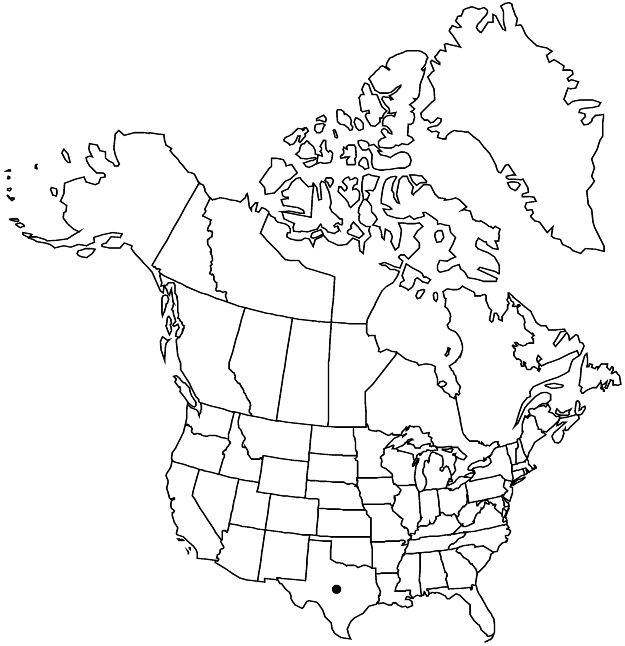Difference between revisions of "Croton heptalon"
Syst. Bot. 35: 159. 2010.
FNA>Volume Importer |
FNA>Volume Importer |
||
| Line 15: | Line 15: | ||
|name=C. albinoides | |name=C. albinoides | ||
|authority=(A. M. Ferguson) Croizat | |authority=(A. M. Ferguson) Croizat | ||
| − | }}{{Treatment/ID/Synonym | + | }} {{Treatment/ID/Synonym |
|name=C. capitatus var. albinoides | |name=C. capitatus var. albinoides | ||
|authority=(A. M. Ferguson) Shinners | |authority=(A. M. Ferguson) Shinners | ||
| − | }}{{Treatment/ID/Synonym | + | }} {{Treatment/ID/Synonym |
|name=C. engelmannii var. albinoides | |name=C. engelmannii var. albinoides | ||
|authority=A. M. Ferguson | |authority=A. M. Ferguson | ||
| − | }}{{Treatment/ID/Synonym | + | }} {{Treatment/ID/Synonym |
|name=C. muelleri var. albinoides | |name=C. muelleri var. albinoides | ||
|authority=(A. M. Ferguson) Croizat | |authority=(A. M. Ferguson) Croizat | ||
| − | }}{{Treatment/ID/Synonym | + | }} {{Treatment/ID/Synonym |
|name=Heptallon aromaticum | |name=Heptallon aromaticum | ||
|authority=Rafinesque | |authority=Rafinesque | ||
| Line 42: | Line 42: | ||
|elevation=0–50 m. | |elevation=0–50 m. | ||
|distribution=Tex.;e Mexico. | |distribution=Tex.;e Mexico. | ||
| − | |discussion=<p>Morphological differences among Croton heptalon and its multifid-styled relatives in sect. Heptallon, especially C. capitatus and C. lindheimeri, can be quite subtle. In general, C. heptalon can be distinguished from C. capitatus by its more elongate pistillate part of the inflorescence, non-recurving sepal tips in the pistillate flowers, and more cordate leaf bases on larger basal leaves. Whitish pubescence on its young growth and styles that branch once into four terminal segments distinguish C. heptalon from C. lindheimeri.</p><!-- | + | |discussion=<p>Morphological differences among <i>Croton heptalon</i> and its multifid-styled relatives in sect. Heptallon, especially <i>C. capitatus</i> and <i>C. lindheimeri</i>, can be quite subtle. In general, <i>C. heptalon</i> can be distinguished from <i>C. capitatus</i> by its more elongate pistillate part of the inflorescence, non-recurving sepal tips in the pistillate flowers, and more cordate leaf bases on larger basal leaves. Whitish pubescence on its young growth and styles that branch once into four terminal segments distinguish <i>C. heptalon</i> from <i>C. lindheimeri</i>.</p><!-- |
| − | --><p>Croton muelleri J. M. Coulter, which is an illegitimate name, pertains here.</p> | + | --><p><i>Croton</i> muelleri J. M. Coulter, which is an illegitimate name, pertains here.</p> |
|tables= | |tables= | ||
|references= | |references= | ||
| Line 67: | Line 67: | ||
|publication year=2010 | |publication year=2010 | ||
|special status= | |special status= | ||
| − | |source xml=https://jpend@bitbucket.org/aafc-mbb/fna-data-curation.git/src/ | + | |source xml=https://jpend@bitbucket.org/aafc-mbb/fna-data-curation.git/src/8f726806613d60c220dc4493de13607dd3150896/coarse_grained_fna_xml/V12/V12_564.xml |
|genus=Croton | |genus=Croton | ||
|species=Croton heptalon | |species=Croton heptalon | ||
Revision as of 15:47, 18 September 2019
Herbs, annual, 5–15 dm, monoecious; stems, leaves, and buds whitish-hairy when young, becoming glabrate. Stems well branched distally, stellate-hairy. Leaves not clustered; stipules linear, 2–7 mm; petiole 0.5–5 cm, glands absent at apex; blade ovate-lanceolate, 3–10 × 1–5 cm, base cordate to rounded, margins entire, apex acute, abaxial surface pale green, not appearing brown-dotted, no stellate hairs with brown centers, adaxial surface darker green, both stellate-hairy. Inflorescences bisexual, racemes, 2–4 cm, staminate flowers 3–10, pistillate flowers 4–8. Pedicels: staminate 2–4 mm, pistillate 1–2 mm. Staminate flowers: sepals (4–)5, 1–2 mm, abaxial surface stellate-hairy; petals 5, linear-oblong-lanceolate, 1–1.5 mm, abaxial surface stellate-hairy; stamens 9–12. Pistillate flowers: sepals 7–8, subequal, 3–6 mm, margins entire, apex straight to slightly incurved, abaxial surface whitish appressed-tomentose; petals 0; ovary 3-locular; styles 3, 3–4 mm, 4-fid, terminal segments 12. Capsules 6–8 × 6–7 mm, smooth; columella tipped with 3-pronged grappling hooklike appendage. Seeds 4–5 × 2–2.5 mm, shiny.
Phenology: Flowering May–Dec.
Habitat: Beaches, coastal dunes, roadsides.
Elevation: 0–50 m.
Distribution

Tex., e Mexico.
Discussion
Morphological differences among Croton heptalon and its multifid-styled relatives in sect. Heptallon, especially C. capitatus and C. lindheimeri, can be quite subtle. In general, C. heptalon can be distinguished from C. capitatus by its more elongate pistillate part of the inflorescence, non-recurving sepal tips in the pistillate flowers, and more cordate leaf bases on larger basal leaves. Whitish pubescence on its young growth and styles that branch once into four terminal segments distinguish C. heptalon from C. lindheimeri.
Croton muelleri J. M. Coulter, which is an illegitimate name, pertains here.
Selected References
None.